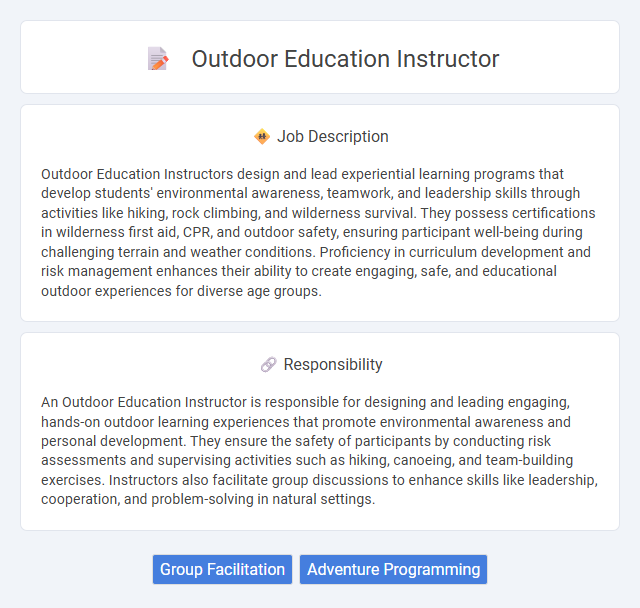
Outdoor Education Instructors design and lead experiential learning programs that develop students' environmental awareness, teamwork, and leadership skills through activities like hiking, rock climbing, and wilderness survival. They possess certifications in wilderness first aid, CPR, and outdoor safety, ensuring participant well-being during challenging terrain and weather conditions. Proficiency in curriculum development and risk management enhances their ability to create engaging, safe, and educational outdoor experiences for diverse age groups.
Individuals who enjoy physical activity, have a passion for nature, and possess strong communication skills will likely be well-suited for an Outdoor Education Instructor role. Those who thrive in dynamic environments and demonstrate patience, adaptability, and leadership potential probably find this job fulfilling. Conversely, people who prefer sedentary work or struggle with unpredictable weather conditions may find this career challenging.
Qualification
Outdoor Education Instructors typically require certifications in wilderness first aid, CPR, and specialized training in outdoor leadership or environmental education. A bachelor's degree in outdoor recreation, education, environmental science, or a related field is often preferred. Practical experience in outdoor activities such as hiking, camping, rock climbing, or canoeing enhances qualifications and ensures effective risk management and student engagement.
Responsibility
An Outdoor Education Instructor is responsible for designing and leading engaging, hands-on outdoor learning experiences that promote environmental awareness and personal development. They ensure the safety of participants by conducting risk assessments and supervising activities such as hiking, canoeing, and team-building exercises. Instructors also facilitate group discussions to enhance skills like leadership, cooperation, and problem-solving in natural settings.
Benefit
Outdoor Education Instructors likely experience improved physical health and mental well-being due to consistent exposure to nature and active teaching environments. This role probably enhances leadership skills and teamwork capabilities by facilitating group activities and managing diverse outdoor challenges. There is a strong chance that job satisfaction increases as instructors foster environmental awareness and personal growth in students through hands-on learning experiences.
Challenge
An Outdoor Education Instructor likely encounters challenging situations that test leadership and problem-solving skills in dynamic environments. Managing unpredictable weather and ensuring participant safety may frequently require swift decision-making and adaptability. These challenges probably enhance resilience and contribute to professional growth within outdoor education settings.
Career Advancement
Outdoor Education Instructors gain valuable leadership and environmental skills that open pathways to advanced roles such as program coordinator, curriculum developer, and wilderness therapy leader. Mastery in risk management, group facilitation, and specialized certifications enhances prospects for senior positions within educational institutions, adventure companies, and conservation organizations. Continuous professional development and networking in outdoor education communities significantly boost career growth and salary potential.
Key Terms
Group Facilitation
An Outdoor Education Instructor specializing in group facilitation leads experiential learning activities that enhance teamwork, communication, and problem-solving skills among participants. They design and implement dynamic programs tailored to diverse groups, fostering collaboration in natural settings to promote personal growth and social development. Expertise in conflict resolution and adaptive leadership ensures inclusive, safe, and engaging outdoor experiences that maximize group cohesion and learning outcomes.
Adventure Programming
Outdoor education instructors specializing in adventure programming design and lead experiential learning activities such as rock climbing, canoeing, and wilderness survival skills. They develop engaging curricula that foster teamwork, leadership, and environmental stewardship while ensuring safety through risk assessment and equipment management. Expertise in outdoor instructional techniques and certification in adventure sports elevate the quality and impact of these immersive educational experiences.
 kuljobs.com
kuljobs.com